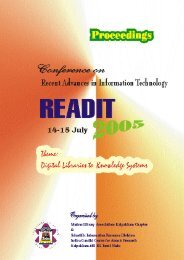READIT - 2009 - Indira Gandhi Centre for Atomic Research
READIT - 2009 - Indira Gandhi Centre for Atomic Research
READIT - 2009 - Indira Gandhi Centre for Atomic Research
You also want an ePaper? Increase the reach of your titles
YUMPU automatically turns print PDFs into web optimized ePapers that Google loves.
Proceedings of <strong>READIT</strong>-<strong>2009</strong>, Kalpakkam - 603 102, 29-30 Dec <strong>2009</strong><br />
The internet phenomenon has changed many jobs. The role of librarians as<br />
in<strong>for</strong>mation brokers in the organisation presents a professional development challenge to the<br />
library profession as a whole. Libraries face impatience from their organisations <strong>for</strong> transition<br />
to new and open methods <strong>for</strong> in<strong>for</strong>mation service delivery, while facing the need to meet the<br />
challenge of professional development of library staff to familiarise with these new<br />
technologies. In rural areas, the in<strong>for</strong>mation technology infrastructure and expertise of<br />
computer support staff to implement new technology is often inadequate to keep up with the<br />
pace of new developments. Professional development <strong>for</strong> library staff is necessary to<br />
implement change, although meetings are often difficult to arrange <strong>for</strong> logistical reasons.<br />
Teleconferencing and videoconferencing are used to enhance professional development.<br />
Nevertheless, change can be successfully achieved through the networking of resources and a<br />
willingness to confront the challenges of serving clients spread over a vast area.<br />
OPEN SOURCE USABILITY PROBLEMS<br />
Open source software has gained a reputation <strong>for</strong> reliability, efficiency, functionality<br />
that has surprised many people in the software engineering world. The Internet has facilitated<br />
the coordination of volunteer developers around the world to produce open source solutions<br />
that are market leaders in their sector (e.g. the Apache webserver). Usability is typically<br />
described in terms of five characteristics: ease of learning, efficiency of use, memorability,<br />
error frequency and severity, and subjective satisfaction (Nielsen, 1993). Improvements in the<br />
usability of OSS do not necessarily mean that such software will displace proprietary<br />
software from the desktop; there are many other factors involved, e.g. inertia, support,<br />
legislation, legacy systems etc. However improved usability is a necessary condition <strong>for</strong> such<br />
a spread.<br />
142<br />
10

















